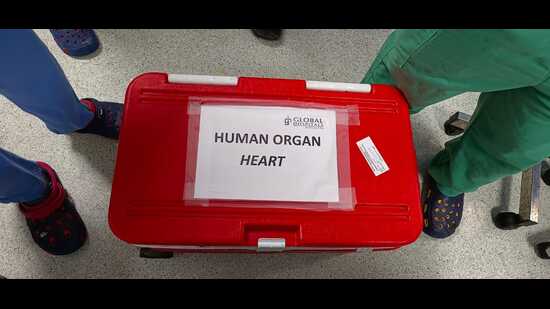How a heart was transported from Vadodara to Mumbai in 150 mins
Mumbai: When his phone rang on the evening of June 6, Manoj Dalvi knew someone’s life hung in the balance
Mumbai: When his phone rang on the evening of June 6, Manoj Dalvi knew someone’s life hung in the balance. A security manager at IndiGo airlines posted in Mumbai’s Chhatrapati Shivaji International airport, Dalvi answered the call. It was from Anoop Lawrence, senior general manager at Global Hospitals in Parel who requested Dalvi’s help to transport an organ from a person declared brain dead in Vadodara to help save the life of a person in Mumbai.

Dalvi and Lawrence had collaborated earlier to transport organs including a pair lungs and kidneys, and once, even a pair of hands. This time, however, was different: they were, quite literally, transferring life. The next day they managed to transport a heart within 150 minutes — a little over two hours — from an operating table in a Vadodara hospital to an operating theatre in Parel on which lay a 34-year-old man.
It had to be timed perfectly.
For one, the two cities have limited air connectivity. In this case, Lawrence received intimation at 6.45 pm on June 6 that a heart was available for Kishore Sonawane who had approached the hospital a few months back with barely 15-20% heart function. “He was breathless after walking even a short distance,” Dr Pravin Kulkarni, head of the heart transplant programme at Global Hospital, who conducted the eight-and-a-half-hour-long operation, said. In mid-May, Kulkarni’s team had put up Sonawane’s name in the Regional Organ and Tissue Transplant Organization (ROTTO), which is connected to a state and a national-level registry.
On June 6, a 30-year-old woman admitted in Parul Sevashram Hospital in Vadodara was declared brain dead, and her heart was made available for donation that could help save a life. By 7.40 pm, Global Hospitals accepted the organ. But there was no flight available at a convenient time.
“And so, we booked an IndiGo flight to Ahmedabad at 6.25 am the following day [on June 7]. From there our team of doctors and clinical staff drove down to Vadodara reaching the Parul Sevashram Hospital at 11.40 am,” Lawrence said.
The team of Mumbai doctors did a quick assessment and found it good for retrieval. The only available return flight to Mumbai was at 7.20 pm on June 7. The IndiGo team comprising Dalvi and his colleagues Paras Mistry in Mumbai and Ramchandra Dwivedi, the security manager at the Ahmedabad Airport, as well as Lawrence kept a close eye on this flight, which was coming into Vadodara from Kathmandu. An incoming aircraft stood the chance of delay. And, for the doctors, this meant a loss of vital time.
“This particular aero transplant exercise was a different challenge for everyone involved given the limited air connectivity that exists between the two cities. It meant a higher risk was involved,” Lawrence said.
Second, transporting an organ requires coordination and has little margin of error. The organ has to be harvested at the right time, and the patient has to be prepared for surgery while the organ is airborne.
Operating one of the largest organ transplant centres in western India, Global Hospitals depended on charter flights to transport organs till the pandemic. Lawrence and his team now use commercial airlines and simply book a seat for the organ box, which the medical team travels with. “Charter flights offer flexibility, but the cost component is huge. It takes anywhere between ₹4.5 lakh to 6 lakh. Since Covid, a few charter operators found it difficult to sustain this. Now, we mostly fly commercial flights unless there is a specific demand,” Lawrence said.
Fate favoured the team, and the patient. The flight landed in Vadodara on time, and made a timely departure for Mumbai. “As soon as we knew that the aircraft was airborne, the doctors [in Vadodaara] began harvesting the heart,” Lawrence said. By the time the flight landed in Gujarat, the team had left the hospital with the organ in its special red box and driven 22 km to reach the airport at 6.45 pm. The flight took off on time from Vadodara airport at 7.25 pm and landed in Mumbai at 8.15 pm. The team got into an ambulance and made it to Global Hospital within 16 minutes as a green corridor had been arranged for them.
Sonawane is currently recuperating in a special negative pressure room and is likely to be discharged soon, Kulkarni said. “He is doing well and we will start him on the treadmill,” he added.
IndiGo’s chief executive officer Ronojoy Dutta said it was “an honor to have contributed to saving a life.”
(With inputs from Somita Pal)
Stay updated with all the Breaking News and Latest News from Mumbai. Click here for comprehensive coverage of top Cities including Bengaluru, Delhi, Hyderabad, and more across India along with Stay informed on the latest happenings in World News.
Stay updated with all the Breaking News and Latest News from Mumbai. Click here for comprehensive coverage of top Cities including Bengaluru, Delhi, Hyderabad, and more across India along with Stay informed on the latest happenings in World News.





